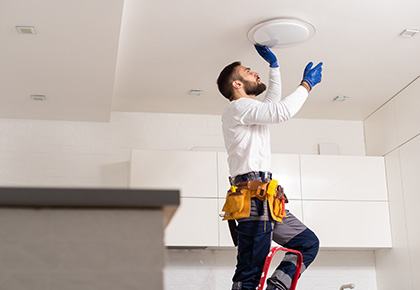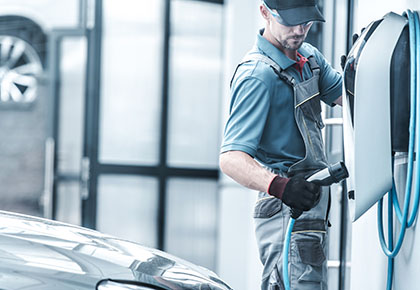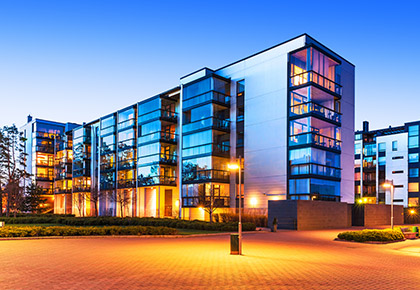-
Incentives Aim to Green Up New York, Reduce Operating Costs for Building Owners
A recent study found that 75% of greenhouse gasses in New York City are generated by buildings, primarily multifamily residential buildings. As part of a city-wide effort to incentivize buildings to develop programs to curb emissions, FirstService Residential held its Third Annual Green Expo & Symposium on May 15 in New York. The event featured a panel of industry experts, including FirstService Residential President Dan Wurtzel, who described the benefits of participating in city programs, as well as the opportunities to save money, help the environment and enhance property values. -
Keeping HOA and Condo Common Areas Clean During the Coronavirus Pandemic
During these unprecedented times, residents are spending the majority of their time at home to prevent the spread of COVID-19 and protect themselves and their loved ones from infection. One of their primary contact points with the outside world is in your HOA or condo common areas, where they can be at risk of contact with lingering coronavirus or even spread existing virus to other areas of the property. Read on for a comprehensive list of places to clean and how to clean them. -
Managing Waste for a Greener Community
With a growing focus on proper environmental stewardship, many associations are working toward implementing green initiatives. But getting there can be daunting. With so many programs and opportunities available for all of us to reduce, re-use and recycle, it’s hard to know where to begin. -
When a Natural Disaster Strikes, Is Your Association Covered?
Hurricanes. Floods. Tornadoes. Hail. Wildfires. Lightning strikes. Earthquakes. Blizzards. Mother Nature has quite the arsenal to throw at us! Unfortunately, every part of North America is subject to one or more of these events. Some, like hurricanes, come with enough advance warning to prepare for them, but most do not. That’s why it is critical to the financial health of your community association to have the proper insurance coverage in place. -
News You Can Use: Flash Flood Safety Tips to Keep Your Family Safe
In many parts of the country, flash flood watches and/or flash flood warnings are often issued during torrential downpours, especially in hurricane-prone and/or low-lying areas. -
Power Outages and Blackouts - How Your Association Can Minimize Risk
Losing power is never fun. But it’s bound to happen at some point, so preparation is the best defense. Obviously, different types of communities are affected by blackouts in different critical ways: high-rises lose their elevators and water; resort-style gated communities lose the ability to operate their gates. For residents, a blackout may be a short-term nuisance. For a community association, it can be a major headache in terms of risk management, safety and potential equipment damage that can provide an unwelcome shock to your budget. -
Promoting Fire Safety in Your Community Association
Part of your job as a board member is ensuring the safety of residents in your community association. To that end, it’s important to educate homeowners about possible fire risks and the steps they can take to prevent fire hazards in their homes. Chances are that fire safety isn’t top of mind for residents. However, home fires are more common than most people realize. -
Put an Energy Saving Program Together for a Multifamily Property
Many HOAs and community associations would like to save energy and energy spending, but they think that putting an energy management plan into place for their multifamily property is difficult to accomplish. FS Energy's Chris Normandeau explains some basic, easy-to-do steps that can make a real impact on an association's energy usage and budget. -
Seven Tips to Avoid Issues with a Contract for Property Management
You’ve been there before. You meet with a vendor, they seem like a great choice, and then after a month or so, you find yourself in a dispute. -

5 strategies for energy conservation in community associations
In this article, we delve into the significance of energy conservation within community associations, exploring its benefits and strategies for effective implementation. -
Simple Energy Conservation Steps to Benefit Your Community This Winter
So what can condo boards or community associations do to mitigate or even reduce costs this winter? Let’s start with what you can do in the summer and fall, before winter actually begins. This includes cleaning, tuning and performing any necessary repairs to heating systems, furnaces and boilers to make sure they won’t be working longer, harder or less efficiently than they should. Other pre-winter tasks include cleaning gutters to remove leaves and debris to ensure water can flow freely. Otherwise, water can become trapped and freeze, which can not only damage your property’s gutters, but also cause ice dams and possible roof leaks. -
Simple Landscaping Tips To Help You Prepare for Storm Season
For most of us, storm season means prepping our residences to mitigate potential damage caused by high winds and heavy rains. But there’s a part of our homes and neighborhoods we often overlook – sometimes with disastrous results. That often-forgotten place is right outside your front door: it’s your landscaping. -

Six steps to implement EV charging in high-rise condos
No longer the products of science fiction fantasy, electric cars are now a reality of everyday life. While the reduced emissions of personal electric vehicles, or PEVs, are good news for the environment, their charging requirements may create challenges for condo associations trying to navigate their infrastructure requirements, legal implications, management concerns and even aesthetic considerations. -
Tips for Eco-Friendly High-Rise Living: Living Sustainably in the City
Many multifamily properties and high-rises want to implement “green” living practices and create eco-friendly communities, but not everyone knows where nor how to get started. Here are some effective and easy tips to help you be proactive and successful in achieving your sustainability goals. Read on for a list of programs and services that can be put in place in your community at little to no cost. -
Tips to Help Your Homeowners Association Organize a Community Recycling Program
Is your homeowners association considering starting a recycling program for your community? If so, bravo! Take a look at some of the benefits: conserving energy, saving water, preserving resources, reducing air pollution and saving landfill space. And did you know that in addition to helping the environment, recycling can also provide economic benefits as well? To get you started, here are some tips and considerations to help your association plan and implement a successful recycling program for your community. -
Ways to Keep Your Community Safe During Tornado Season
Tornadoes are fearsome because of their unpredictable nature. Although there are certain weather conditions that make tornadoes more likely, such as severe summer thunderstorms, tornadoes can also be created by snowstorms and blizzards. They can strike at any time of year and almost any place, even forming on the water and moving onto land. -
How to Uncover Savings for Your Condo or Co-op Association with an Energy Audit - Energy Efficiency Part 2
Improving your building’s energy efficiency is good for your budget and for your property values. Getting a professional energy audit is a crucial step on the road toward energy efficiency. It can tell you which upgrades make the most sense for your property and show you potential energy and cost savings. -
Updating Your Community Emergency Preparedness Plan for Pandemics
In the past, when planning for emergencies, a global pandemic was likely not on your list. While most board members did not anticipate a pandemic as something that needed a plan before COVID-19, it's now clear that communities need to develop a plan to address this and any future pandemics. Read on to learn how to build a community emergency preparedness plan with a possible resurgence of coronavirus and other potential pandemics in mind. -
HOA Vendor Management: Tips for great results
Here are some tips to manage your HOA vendors more effectively & and get the results you're looking for. -

5 ways to reduce energy costs in your condo or coop
No matter where your high-rise building is located, rising energy costs can have a drastic impact on your community association’s budget. Implementing methods to conserve energy can help your association reduce energy costs and optimize your high-rise’s annual budget. -
What Our Clients and Vendors Are Saying
Finding a property management company to partner with your board isn’t easy. Find out how we can help you. -
What to Know in the Unlikely Event of a Mass Shooting in Your Building
Public Mass shootings have unfortunately become common place in America and around the world. From schools and movie theaters, to businesses and homes, shootings have occurred in a mix of environments. But what should you do if you unexpectedly find yourself in the middle of this kind of emergency at your residential building? -
What Do I Need To Know About Floods?
2016 saw the United States swamped in a record year of flooding, the most since record keeping began in 1980. Devastating flooding swept Louisiana, West Virginia, Texas and Maryland, costing billions in damage. In Canada, about half of all natural disaster costs are incurred from flooding, reaching into the billions of dollars in recent years. -
Why Your Community Must Plan for Emergency Communication and Training
Whether you live in a high-rise condominium in Chicago, a homeowners association (HOA) in Houston or an active adult community in Las Vegas, emergencies can happen. Do you think your residents would know where to go or whom to contact in an emergency situation? Does your onsite staff know what to do to protect residents and the community’s property in the event of a major storm like a hurricane, tornado or severe blizzard? How well would they handle a flood, a fire or a violent outbreak?